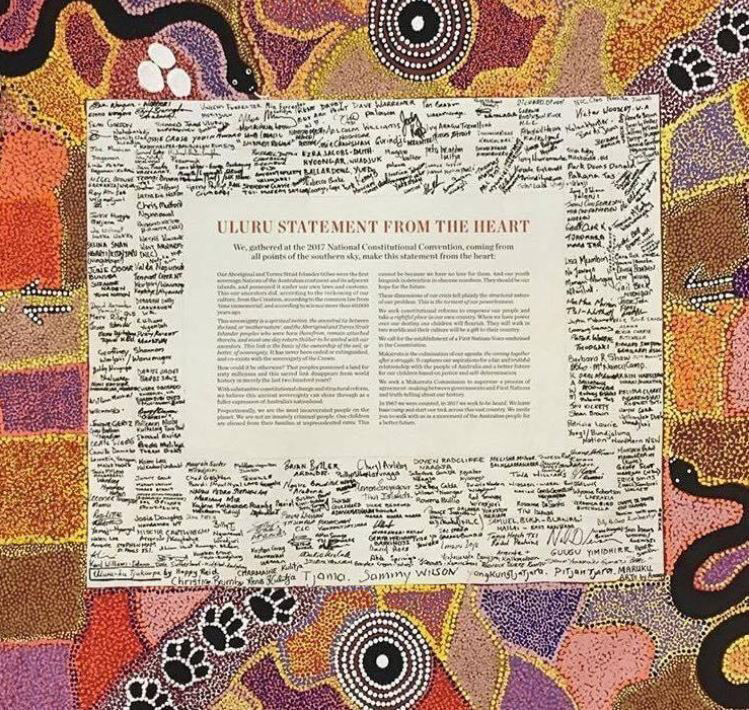What is this about?
When Australia’s Constitution was being drafted in the late 1800s, Aboriginal and Torres Strait Islander peoples were not consulted. The Constitution therefore reflected the views of non-Aboriginal Australia: it excluded us from being counted as part of the Australian population, and left it to the States to make laws about us. The States used this power to deny our peoples their rights, dispossess us of our land, and remove our children from their families.
In 1967, Australia held a referendum in which 90% of Australians voted to count us as Australian citizens and to give the Australian Government the responsibility to pass laws on issues affecting Aboriginal and Torres Strait Islander people.
The 1967 Referendum was a big step forward. But the Constitution still does not recognise us as the First Peoples of Australia. Nevertheless, Aboriginal and Torres Strait Islander people have continued to struggle for a proper formal recognition of our place in the nation. This has been acknowledged as unfinished business by many Australian Governments.
In May 2017, Aboriginal delegates from across Australia – elected by communities as part of the Referendum Council’s 12 Regional Dialogues held across Australia in 2016 and 2017 – came together at Uluru to make an agreement on how Aboriginal and Torres Strait Islander peoples should be recognised in Australia’s Constitution. The delegates composed and agreed on the Uluru Statement from the Heart, which calls for three things, Voice, Treaty, Truth.
Voice: a First Nations Voice enshrined in the Constitution, where representatives of Aboriginal and Torres Strait Islander people would speak directly to the Australian Federal Parliament.
Treaty: setting up a Makarrata Commission to supervise the making of treaties between Aboriginal and Torres Strait Islander and non-Indigenous Australia
Truth: alongside the treaty-making, the Makarrata Commission would oversee a process of truth telling about the shared history of Aboriginal and Torres Strait Islander and non-Indigenous Australia.
The Australian Government rejected the proposal for Voice, Treaty, Truth put forward in the Uluru Statement from the Heart.
Instead, in October 2019 the Minister for Indigenous Australians, Ken Wyatt, announced the start of an Indigenous Voice co-design process, led by three bodies with both Aboriginal and Torres Strait Islander and non-Aboriginal membership. The terms of reference of all three groups specifically forbids them from making recommendations on constitutional recognition or any of the other Uluru Statement from the Heart demands.
The Co-design groups have been carrying out consultations across Australia that include both non-Indigenous people as well as Aboriginal and Torres Strait Islander people.
What does Congress think about this?
Congress supports the Uluru Statement from the Heart and its three key elements: Voice, Treaty, Truth, and we continue to advocate for a National Voice to the Australian Federal Parliament enshrined in the Constitution (the nation’s rule book).
For this to happen, there needs to be a Referendum where all Australians vote on making changes to the Constitution. If an Indigenous Voice was created in this way, it would be protected by the Constitution as the only way it could be taken away is through another Referendum. Along with a constitutionally-enshrined National Voice, Congress supports truth-telling and agreement-making through a Makarrata Commission.
Congress has recently (April 2021) made a submission to the Co-design process, through the National Indigenous Australians’ Agency (NIAA), reaffirming our support for the three elements called for in the Uluru Statement and documenting how each of these elements will support better health for Aboriginal and Torres Strait Islander peoples.
- A national Indigenous Voice to Parliament would be an expression of self-determination. It would advise Parliament on all matters affecting Australia’s First Nations and provide the over-arching policy structure under which the health of Aboriginal and Torres Strait Islander communities could be addressed.
- A Treaty is an agreement between First Nations peoples and governments, in which formal recognition is made of First Nations peoples’ sovereignty and self-determination. Treaties can be a way for Aboriginal people to negotiate with governments to protect our rights to water, land, education, housing and health services. In other countries, treaties between First Nations and governments have had positive health and wellbeing impacts because treaties can be a way to strengthen Aboriginal peoples’ access to, and control of, health and other services that governments are responsible for providing.
- ‘Truth Commissions’ are often set up after a period of conflict to hear the truth about past crimes or violence. Such Commissions have been used in many places around the world, including in South Africa after the fall of apartheid, and in East Timor after the end of the Indonesian occupation. They are important to make sure that both sides share a proper understanding of their country’s history and to enable a genuine process of reconciliation. ‘Truth telling’ can have an impact on health: having history heard and acknowledged can lead to healing for those people whose experience has been ignored or suppressed by the colonial powers.
What happens next?
The Australian Government’s ‘Voice Co-design’ consultation process has now concluded. Consultation session summaries and public submissions to the co-design process (many of which continue to support the Uluru Statement from the Heart) are available through the NIAA website.
Final recommendations will be made by the Co-design groups to the Australian Government later this year. However, Congress, along with many Aboriginal and Torres Strait Islander organisations and individuals, continues to support the call of the delegates at Uluru in 2017 for Voice, Treaty, Truth.
Find out more
Congress submission to the Indigenous Voice Co-Design Process (April 2021)
Congress submission to the Referendum Council on Constitutional Recognition (May 2017)
Uluru Statement from the Heart
